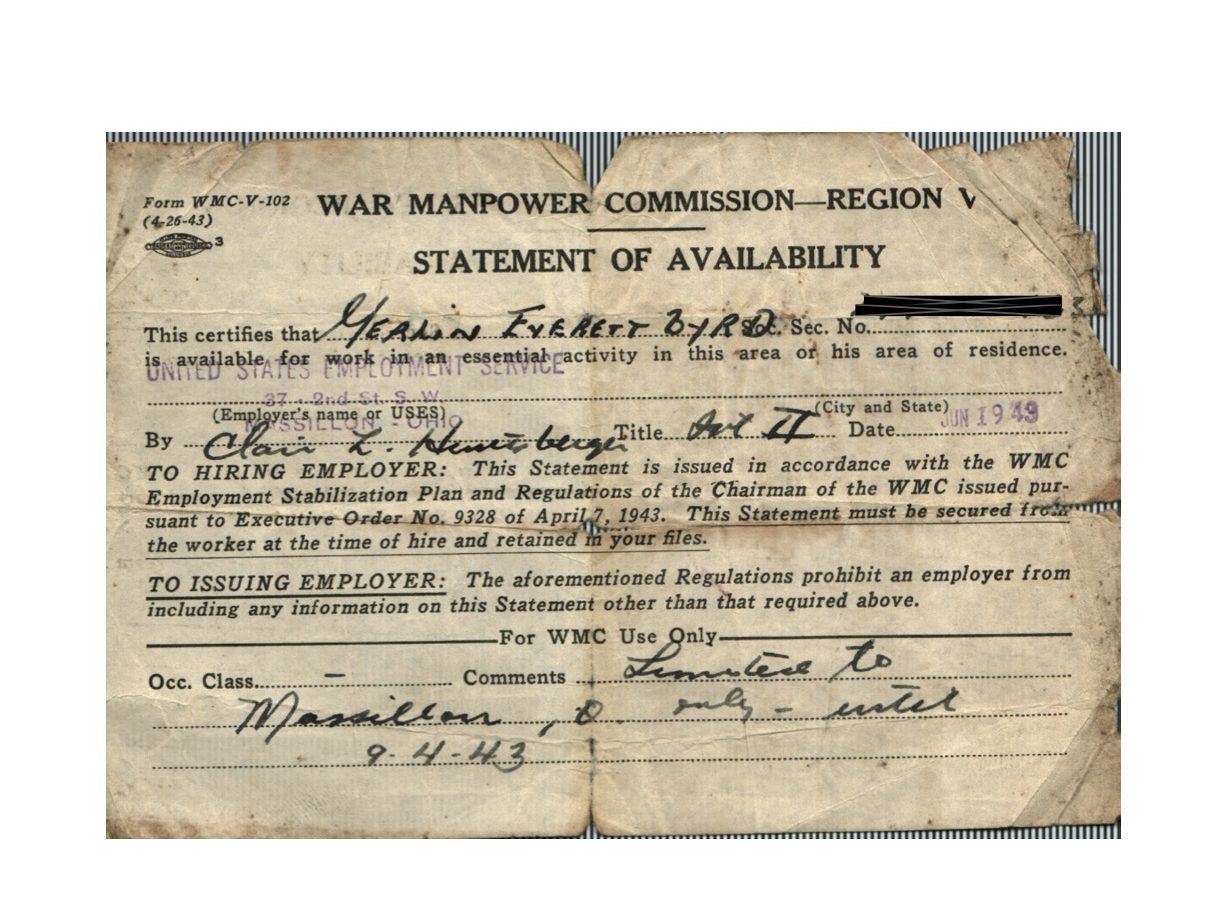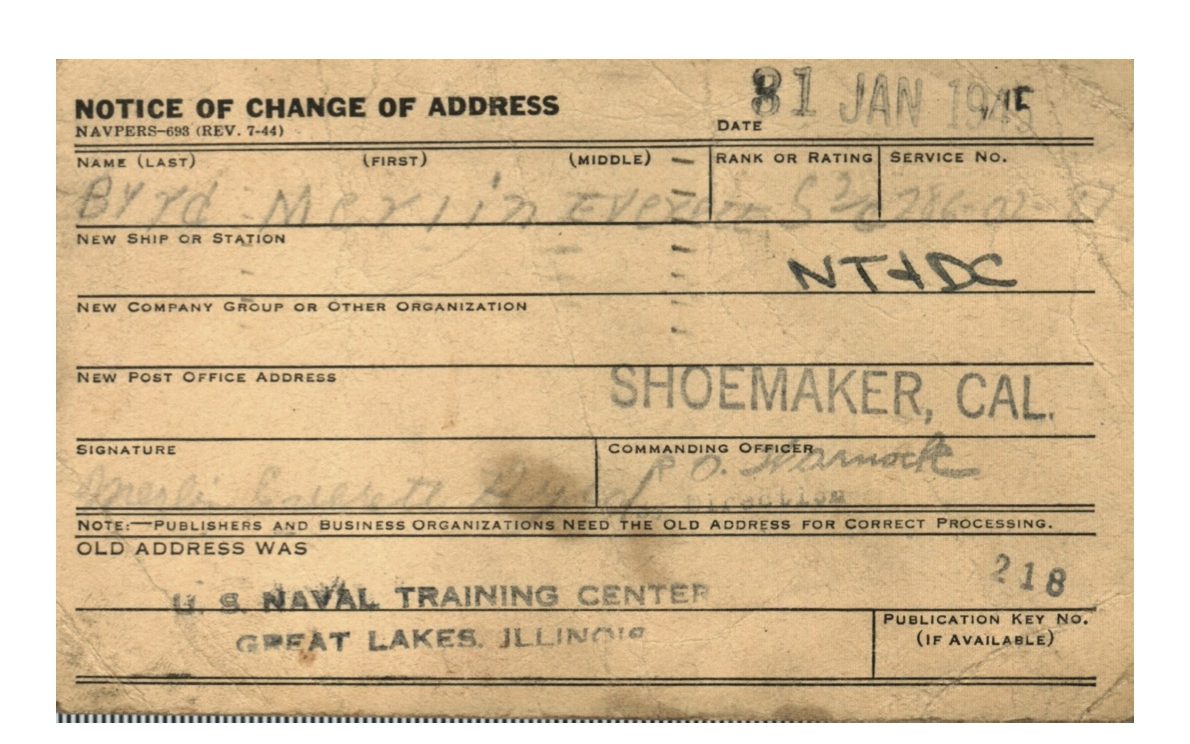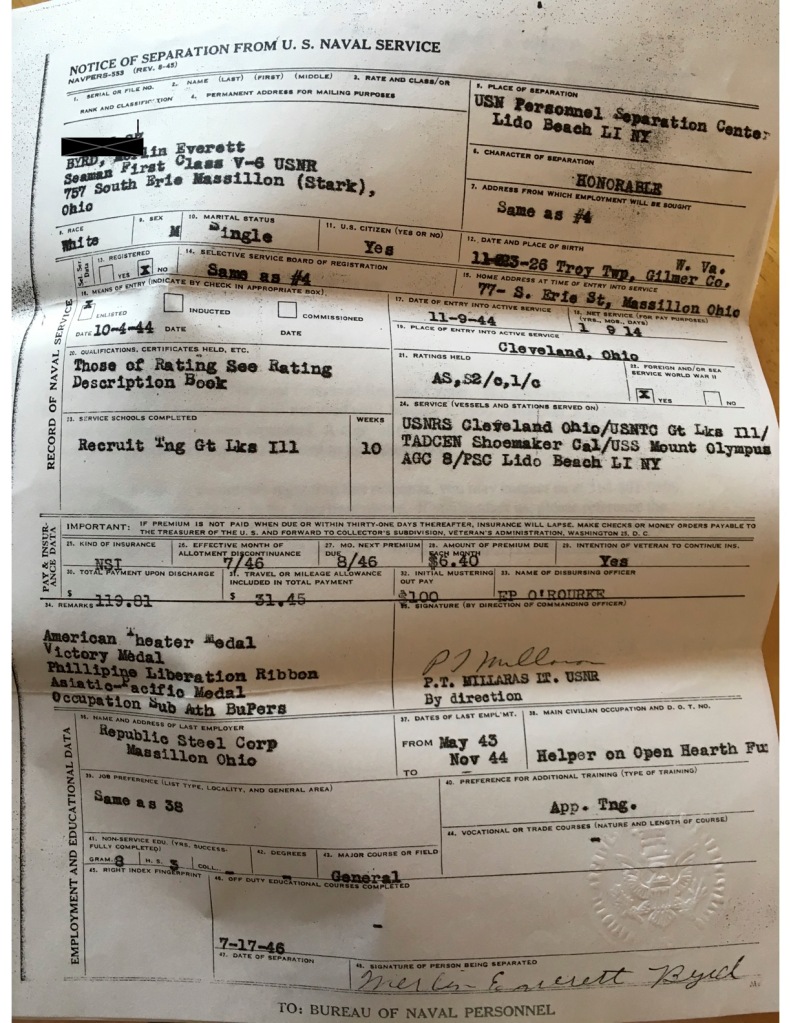As children, we rarely think about our parents’ lives. In fact, my adolescent self would have said with some certainty my own parents didn’t really exist until my siblings and I came along. (The “obviously,” if not spoken, would certainly have been implied.)
Now that I’m older I realize how lucky I am to have a mother who is still lively enough at ninety to answer some of the questions I’m sure I would regret not asking. (We use Bob Greene and D.G. Fulford’s “To Our Children’s Children” as a guide.)
However, my dad died in 2002, having been afflicted with Alzheimer’s several years earlier. This cut short any possibility of hearing much about the life he led before I knew him.
Oh, there were inklings of the past:
- The foreign money and Japanese teapot he brought back from World War II.
- Mom’s mention that he’d been in high school at age twelve.
- Him once saying there had been a fire sometime in his childhood, his family escaping with only their blankets.
- Also, he had a college education — a rarity in our neighborhood — a BS from Glenville State (in West Virginia) financed through the GI Bill.
- There, he finished his coursework in three years, planning to become a teacher … at least until the experience of student teaching convinced him otherwise.
- He was in a fraternity, and for a long time our spankings were administered with a paddle he’d received on joining. I realize now it was probably part of a hazing ritual. (A paddling by your future frat brothers seems positively innocent in these days of students dying by alcohol poisoning in similar rituals, although from the Wikipedia page, it’s clear needless deaths by fraternity hazing has a long and tragic history.)
- Somewhere there exists a picture of Dad at a bar in his Navy uniform, and I also remember Mom saying my grandpa told him he’d never amount to anything(!) because he evidently liked to drink.
- That may have something to do with another story he told me, about how while he was in college, he’d once bought and drank a six-pack. Since alcohol was forbidden on campus, he threw the bottles outside someone else’s window. That “someone else” turned out to be a football player who was either kicked off the team or banned for some games as a result.
“Did you ever tell him?” I asked.
Dad responded, “Are you kidding? He would have beaten the sh– out of me!” - As kids, we each had a turn wearing his US Navy uniform for Halloween. It fit because he was just a skinny kid when he joined.
- Someone (maybe Dad himself) told me me he got two leaves while in the service. On one, he got the mumps. On the other, it was the measles.
- He also got miserably seasick when he first went to sea.

This teapot, which Dad brought back from Japan, was decorated with hand-painted yellow and red flowers, which eventually washed away after the pot was used for too many tea parties. 
The flag from Dad’s funeral
Sometime after his death, in one of my genealogical research frenzies, I even sent away for Dad’s service records. And when my stepmother went into a nursing home, my stepsister kindly made sure I got most of his papers, some of which I’ve scanned and put into archival boxes.
Still, I never really pieced the information into a cohesive whole (and haven’t yet).
What I have done, just recently, is put together a timeline of his military service, and it’s that I’m sharing now. It’s not the story of a dashing hero, but a teenager from West Virginia who found himself thousands of miles from the mountains in a place very different from home.

From his separation papers, I learned he was employed by Republic Steel in Massillon as a “helper on open hearth furnace” from May 1943 to November 1944. My grandfather’s obituary said Grandpa he retired in 1964 with 21 years at Republic, so he probably got Dad the job.
I found an article from Indeonline.com that quoted a former Republic employee, “The area was ripe with manufacturing jobs. [Al] Longbrake remembers people joking that if they didn’t like their job they could walk down the street and find another one because someone was always hiring. The other joke of the time, he said, came from the West Virginians who came to the city for work. ‘They used to say that in West Virginia you studied the three Rs: reading, writing and Route 21.'”
So, my family wasn’t the only one who made the northern trek to Massillon for work. The 1940 census also says Grandpa had been doing roadwork on “Public Emergency Work (WPA, NYA, CCC, etc.).” According to Mom, he dug ditches, and a well-paying job in a steel mill must have been appealing, even if it meant moving hundreds of miles.
But working in an essential industry didn’t keep my dad out of the war for long. From the same separation papers, I found the date of his enlistment, 4 October 1944. He always said he enlisted to avoid being drafted into the Army.
However, his “report for service card” instructs him to show up on 3 October of the same year.


15 November 1944.

Troops were sent to California by train, which I remember Dad once mentioning to The Engineer. That memory is fuzzy, but I confirmed by a Library of Congress audio recording of Raymond Harris’s oral history of his war. (I also remember Dad saying something about stopping in Kansas, but Raymond doesn’t mention that.)
This recording confirmed a lot of things I remembered hearing from my dad, and if you have any interest in hearing about US military veterans’ history, I highly recommend checking out that part of the LOC website.
Dad and Raymond (from the LOC recording) were both assigned to the USS Mount Olympus, although Raymond was discharged before my father. Mount Olympus was an AGC (Amphibious Group Command), launched in August 1943, sailing for the Philippines where she served as a floating headquarters.
From the naval military history website:
“… she called at Ulithi to allow Commander, 3d Amphibious Force, to disembark to travel by plane to Hawaii, while she herself sailed for overhaul at San Francisco, arriving 11 February[Kym’s note:1945] and leaving 22 April for Hawaii and Guam.
Arriving Guam 6 July, Mount Olympus sailed on for Manila, colliding en route with oiler Millicoma. The flagship was escorted to San Pedro Bay, Leyte, for repairs by Ajax, then continued to Manila, arriving 3 August. After the close of hostilities, Mount Olympus arrived Tokyo Bay 2 September with the 1st Cavalry Division on board for Yokohama. After 8 months moving occupation troops from the Philippines and other bases to ports in Japan and China, she left Shanghai 28 May 1946 for San Diego, the Panama Canal, and New York, arriving 7 July.”
This, in a nutshell, was my father’s war.
According to Raymond, the ship stopped at San Diego, Pearl Harbor, Guam, and the Philippines, where they were rammed. Another ship was torpedoed around that time and place. While the Olympus was in dry dock being repaired, those on board got the news that the atomic bomb had been dropped.
The Olympus led the convoy into Tokyo Bay, which Raymond described as being full of ships and “thick with airplanes, B29s.” Raymond compared the ship to the Pentagon because it carried the commanders. Dad had referred to it as a troop carrier.
When asked what there was to do on the ship, Raymond said not much, although there was a band and sailors got shore leave about once every four days while in port. He said the Navy was really confining, “not like the Army,” which “let you stay out all night.” Apparently, the Navy let you off around one o’clock, and you had to be back aboard by five.
I listened to a few tapes of men who had been on the ship, and one of them (possibly Raymond) described going on shore leave as being surrounded by sailors, that all he could see was the white hats of their uniforms.
According to both Raymond and my Dad, at one point Admiral Byrd was on the ship (interesting because it’s possible there is an extremely distant relationship between the two Byrds — my father and the admiral).
And Raymond also mentions them going back and forth between Japan and China.
I know Dad was in Tokyo for the official Japanese surrender because I have this.

On the Fold3 database, I found three muster rolls for Dad on the Mount Olympus, one for the quarter ending October 1945, one for January 1946, and one as he was being discharged in July of 1946. In October 1945, he was an S2c (Seaman 2nd class), but by January 1946, he’d worked up to being an S1 (Seaman), and his discharge paper lists him as having been AS (Able Seaman), S2/c,1/c. I couldn’t find out what the c,1/c means, but I believe Able Seaman and Seaman 1st Class may be interchangeable.
On 23 April 1946, they were in port in Shanghai when a tragedy unfolded on an LST (Landing Ship, Tank) that was also stationed there. A nineteen-year-old sailor just two months out of the US and fresh off standing a two-hour midnight watch “went suddenly berserk” and shot to death nine shipmates before stabbing himself. The quote is direct from several Newspaper.com clippings, leading me to believe the papers copied it word for word from a naval press release. The young sailor also injured a tenth shipmate before being knocked to the ground with a bench by another sailor.
Dad kept a clipping about the funeral services, and I can’t help wondering what he thought when he heard about the event.
Three months later, at age nineteen, Dad was discharged and given a travel allowance to find his way home from New York.

A further review of the document says he had three years of high school when he enlisted at seventeen. We know he was working at the steel mill by age sixteen, which means he had to have completed those years before going to work.
Ergo, he was in high school by at least age thirteen.
A deeper look at the 1940 census tends to uphold my mom’s version of events — that he skipped two grades and was in high school at twelve. From the census (taken in April), Dad is listed as having completed eight years of school at age thirteen. From this, we can surmise, he was in his first year of high school, having turned thirteen in November the previous year. Meanwhile, his younger sister, age ten, has completed three years of schooling.
If I had to guess, I’d say it’s likely the family moved to Massillon sometime after Dad’s third year of high school, and he didn’t re-enroll until after the war. If my grandfather’s obituary is accurate (and it may not be), Grandpa started at the steel mill in 1943. Of course, there’s no way of knowing if he started work immediately at Republic or if the obituary is accurate.
Moving forward from Dad’s discharge from the Navy, I found him mentioned in the 22 May 1947 issue of the Evening Independent (Massillon). This article says fifty-two of Massillon Washington High School’s 452 graduates (the largest class in history at that time) were veterans of World War II who completed their studies by correspondence. My father is listed among them.
Referring again to the separation document, I noticed under “Preference for additional training,” Dad asked for apprentice training (the handwritten copy spells out what “App. Tng.” stands for).
I wondered what happened to change his mind. But, then I remembered Grandma.
My Grandma Byrd was that unusual creature (especially in West Virginia), an educated woman. I wrote about her family in an earlier post focusing on the fact that at least three children of six in her family had some college education or vocational training.
Her husband, my grandfather, like many in that time and place, completed eighth grade. But Grandma finished the year of college necessary for her to teach school in a one-room schoolhouse.
One of her brothers attended Glenville State for two years, and a sister was in nurse’s training when she died of TB.
I know Glenville was a teacher training college, which makes me wonder if that’s also where Grandma went.
At any rate, I’m sure it was she who changed my dad’s mind and set him on a path to higher education.
Like so many others of his time, my dad’s life was changed by war when he was still in his teens. Although he never fought in any battles, I’m sure he saw the aftermath of those waged in the South Pacific.
I think about myself at sixteen, seventeen, eighteen, nineteen, and can only wonder how he must have felt.
Dad served one year, nine months, and fourteen days and is buried with many of his fellow veterans in the Ohio Western Reserve National Cemetery.
I didn’t know (or didn’t remember) that your Dad worked at Republic Steel. Isn’t it funny that 3 neighbors all worked in steel mills? Mr. Deutsch worked at Republic, too. I have always thought the one in Cleveland, but am not sure. My Dad worked at U. S. Steel in Cuyahoga Heights. His Dad, sister, and brother-in-law all worked there at one point. My Dad retired in 1983 (I think) after 32+ years. Grandpa retired in 1970 (!) after 50 years! I love reading your blog! I am going to start my family’s genealogy later this summer. Barb did research years ago, but not too in-depth.
LikeLike
I never knew either until I was looking over his war docs. And it seems like he worked there a very short time. I only knew him as working for Goodyear and coming home smelling of rubber. That’s where he met Mom. I remembered your dad worked there. Seemed like everyone worked at a steel plant or one of the carmakers back then, and Dad was the odd one out – working at Goodyear. Didn’t realize Grandpa retired from Republic either. I only remember him as retired, which makes sense since he retired in ‘64.
When you start genealogy, just remember not to take other people’s trees as fact. Many have few or no sources. And often, there are people with the same names in the same generation in the same place so it can get confusing.
Also, when you’re starting, remember familysearch.org is free, and you can also use some databases from the library for free too.
LikeLike
Thanks for the tips!
LikeLike
You’re welcome! Genealogy is so fascinating (to me, at least). I sit down for an hour, and look up and three have passed.
LikeLike
My dad also enlisted in the Navy to avoid being drafted into the Army. His draft notice arrived the week he left for boot camp.
LikeLiked by 1 person
I think it was viewed as a better option than the army. I seem to recall Dad saying something to that effect, although I’m not sure he accounted for the possibility of seasickness.
LikeLike
You’re lucky to have access to so many of his papers. My father was an inveterate thrower-out of things later generations would have enjoyed deciphering. We have nothing.
LikeLiked by 1 person
I know I am, especially because my parents were divorced after 27years, and both remarried. It would have been easy for his second wife’s family to toss the paperwork after his death or later when they moved their mom into a home. But they made the effort to get them to me, (apparently I have become the family historian). I am very grateful to them for doing so.
LikeLiked by 1 person
Pingback: Un-American? | The Byrd and the Bees
Pingback: “May You Live in Interesting Times” Is Not a Blessing | The Byrd and the Bees